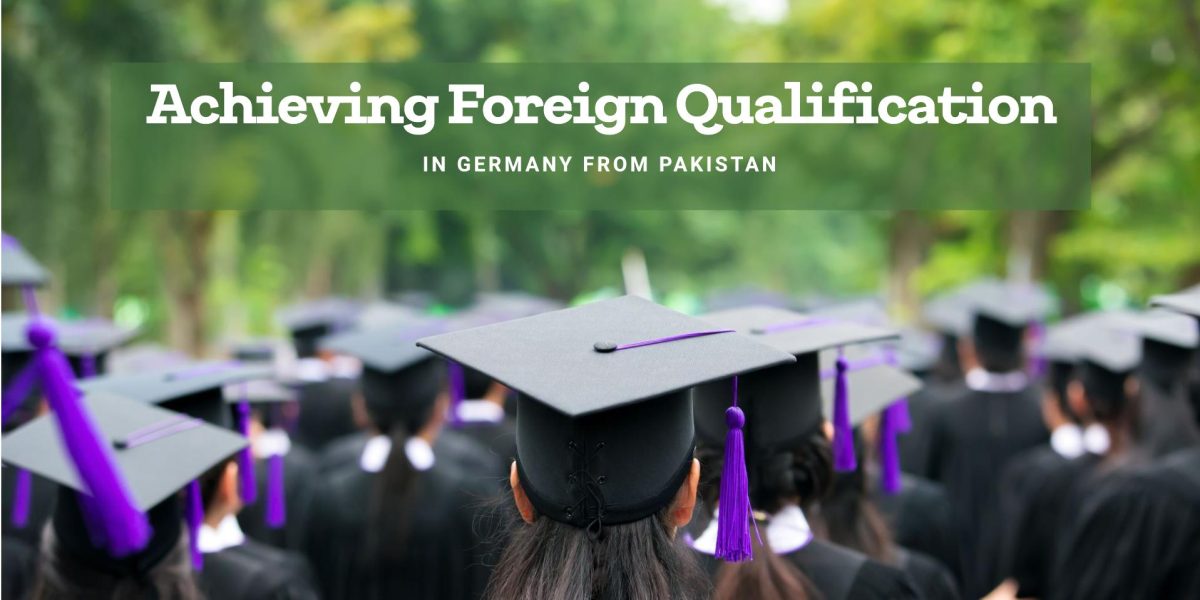Germany’s strong economy and renowned educational system make it a top choice for those looking to advance their qualifications. For Pakistani professionals and students, obtaining a foreign qualification in Germany opens doors to international career opportunities, higher earning potential, and a promising future.
Why Pursue a Foreign Qualification in Germany?
- Global Recognition: German qualifications are highly respected around the world, creating vast career opportunities globally.
- Advanced Education System: Germany offers cutting-edge facilities, a strong research culture, and a focus on practical learning.
- Affordable Tuition: Many German universities charge minimal or no tuition fees, making it an attractive destination for Pakistani students.
- High Demand for Skilled Workers: Germany’s need for skilled professionals provides openings for individuals with foreign qualifications.
- Cultural Exchange: Studying or training in Germany offers an enriching cultural experience and a diverse professional environment.
Types of Foreign Qualifications in Germany
- University Degrees: Bachelor’s, Master’s, and Doctoral programs in fields like engineering, IT, medicine, and business.
- Vocational Training: Dual education programs that combine academic knowledge with hands-on experience.
- Professional Certifications: Certifications in fields such as healthcare, technology, and finance.
- Language Proficiency: German language qualifications (e.g., TestDaF, Goethe-Institut certifications).
- Skills Recognition: Recognition of foreign professional qualifications for working in Germany.
Eligibility Criteria for Pakistani Applicants
To pursue a foreign qualification in Germany, Pakistani applicants must meet the following requirements:
- Educational Background:
- For university programs: Completion of higher secondary education (Intermediate or equivalent).
- For vocational training: Completion of secondary school (Matric or equivalent).
- Language Proficiency:
- Most programs require proficiency in German (B1 or higher) or English (IELTS/TOEFL).
- Financial Proof:
- Evidence of sufficient funds (around €11,208 in a blocked account) to cover living expenses.
- Admission Letter:
- A confirmed admission letter from a German university, vocational training institute, or certification provider.
- Health Insurance:
- Extensive health insurance valid for the entire duration of your stay.
- Visa Requirements:
- Apply for a student or training visa at the German Embassy in Pakistan.
Step-by-Step Guide to Achieving Foreign Qualifications in Germany
Research Opportunities:
- Identify programs or certifications that align with your career goals.
- Explore German universities, vocational programs, and certification bodies.
Fulfill Admission Requirements:
- Meet academic prerequisites and gather the necessary documents.
- Prepare for language proficiency tests (German or English).
Apply to Institutions:
- Submit applications to universities or training institutions, ensuring deadlines are met and all information is accurate.
Secure Admission:
- Once accepted, obtain an admission letter or training contract.
Prepare for Visa Application:
- Gather necessary documents: Passport, acceptance letter, language proficiency certificate, proof of finances, and valid health insurance.
- Submit your student or vocational training visa application at the German Embassy in Pakistan.
Plan Your Travel:
- Organize accommodation and familiarize yourself with German culture and regulations.
- Attend orientation programs at your institution.
Challenges Faced by Pakistani Applicants
- Language Barrier: Proficiency in German is essential for most programs. Dedicate time to learning the language.
- Financial Requirements: Setting up a blocked account may pose a challenge; consider exploring scholarships and funding options.
- Cultural Adjustment: Adapting to German culture and lifestyle requires time and effort.
- Application Delays: Ensure all documents are accurate and submitted on time to avoid delays.
Tips for Success
- Start Early: Research programs and begin learning German well in advance.
- Stay Organized: Keep track of application deadlines and document requirements.
- Seek Support: Use resources like the DAAD (German Academic Exchange Service) for guidance.
- Embrace Opportunities: Take part in internships, networking events, and career fairs in Germany.
Conclusion
Pursuing a foreign qualification in Germany is a life-changing step for Pakistani students and professionals seeking career advancement and personal growth. By following the outlined steps, meeting the eligibility criteria, and preparing thoroughly, you can set yourself on a path toward a successful future in Germany. With globally recognized qualifications and expanded career prospects, studying or training in Germany can provide the foundation for a brighter tomorrow.
FAQs
What are the costs of pursuing a foreign qualification in Germany?
Tuition fees are generally low for public universities, but living expenses average €850 per month.
Is German language proficiency mandatory?
For most programs, yes. However, there are some English-taught courses available.
Are there scholarships for Pakistani students?
Yes, scholarships are offered by DAAD, Erasmus+, and other organizations.
How long does the visa process take?
Visa applications typically take 6-12 weeks.
Can I stay in Germany after completing my qualification?
Graduates can apply for a job search visa or work permit to stay and work in Germany.
What is the blocked account requirement?
A blocked account is a financial guarantee of approximately €11,208, ensuring you can support yourself during your stay.
Do vocational training programs provide a stipend?
Yes, most vocational training programs offer monthly stipends ranging from €600 to €1,200.
For more information, visit: www.visahotspot.com












